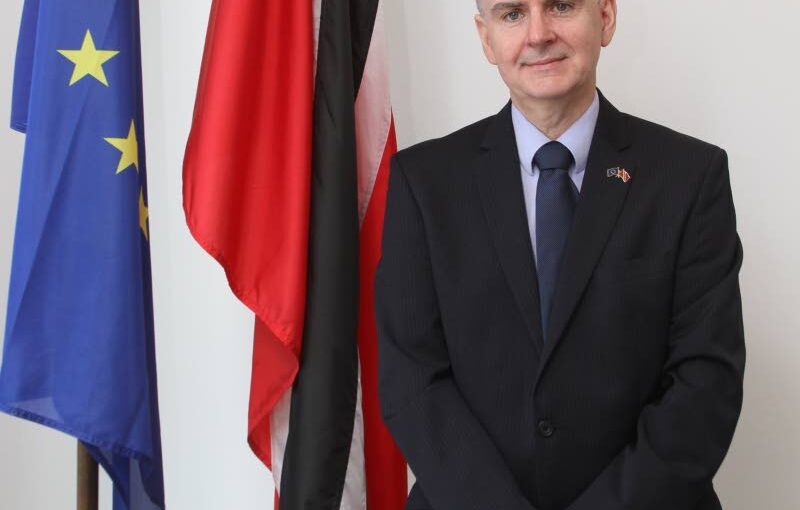Getting Trinidad and Tobago business fit for Europe
Written by reggietnt868radio on November 21, 2024

THE EUROPEAN MARKET is the largest in the world, with a population of more than 448 million people in 27 member states.
TT, as one of the Cariforum member states, has a jump on the competition worldwide on dealing with European businesses, as it signed the EU/Cariforum economic partnership agreement (EPA) way back in 2008.
The EPA gives TT and other Cariforum states easier access to trade relationships with Europe, as one of the mandates of the agreement is to promote and export non-energy goods and services from Cariforum states to the EU.
In his remarks at the Trinidad Hilton on Monday EU Ambassador Peter Cavendish said TT’s trade relationship with Europe already results in $33.58 billion in exports from TT to Europe. He added that businessmen and businesswomen can visit any country in the EU and stay for as long as six months.
But the European market is not for the faint of heart. The standards for entering the market are high and the competition to stay in it is stiff, especially since it is also one of the most saturated markets in the world.
This is why the Fit For Europe programme was launched in TT through the collaboration of the Ministry of Trade and Industry, the Caribbean Development Bank, consultancy firm Market Scope International and the EU.
The programme was launched in 2016, with the goal of enhancing the readiness of TT businesses to enter the market. This year, the programme took on 20 businesses out of 100 applications. As a result, a contract has been offered to one of the businesses, and several negotiations are ongoing with European stakeholders.
EU opportunity
At the closing ceremony of Fit For Europe II, Hanna Vokes director and project consultant of Market Scope International, said there were great opportunities in Europe for Caribbean countries to expand and grow into the market.
“We have seen that there is a clear opportunity for differentiated niche products with a story to tell across Europe,” she said. “There are also opportunities for bean-to-bar chocolate across Europe and alcoholic beverages in Scandinavia.”
However, she said there were significant challenges facing TT businesses that would prevent them from entering the market.
She said each member country has its own identity, cultural moods, opportunities and challenges and each country has its own legislation, regulations and policies, of which each business needs to be aware and to comply with.
“Companies looking to target European partners need to be aware of the cultural nuances of the specific countries they are targeting, ensuring they are fully aware of and up to date with EU and country-specific compliance and they are adequately prepared in terms of risk management and done their research and due diligence on the opportunities and potential target partners,” she said.
The Fit For Europe programme was designed to coach businesses in identifying the target markets and all the intricacies involved in entering them.
This year’s programme trained businesses in different areas, including branding, market entry strategies, propositioning and EU standards, through workshops, mentorships and market research.
In addition to capacity-building the programme arranged “matchmaking” meetings with businesses and potential partners.
Fit for Europe II focused on entry into the German and Swedish markets.
Germany, Volkes said, has a population of 83 million people. It is the largest consumer market in Europe and the fourth largest market in the world.
The volume of trade, consumers and its location in relation the rest of Europe makes it a significant market for exporters. It has a federal system with 16 states which each have their own parliament, constitution and autonomous government. Sweden is the largest Scandinavian countries, and one of the least populated, with approximately ten million people. It is a limited constitutional monarchy, with a parliamentary system.
Vokes said public-private partnerships were at the centre of Sweden’s economic model.
“Sweden is one of the innovative, competitive and transparent countries in the world, with few barriers to entry.”
It was ranked the fourth most competitive country in the world in 2022.
Sweden is highly focused on the environment, Volkes added, with 60 per cent of its energy coming from renewables, and to be fossil-free and using 100 per cent renewable energy by 2045.
With regard to innovation, Sweden ranked second out of 132 economies in the 2023 global innovation index.
Vokes said part of the programme included outreach and matchmaking exercises to get local companies into the market. For one company, she said, the programme reached out to 144 companies in Germany and 117 in Sweden. Ten business-to-business (B2B) meetings were also held. Coming out of the outreach, four companies shortlisted the local business in their supplier databases.
A transformative journey
Cavendish described the programme as more than a training programme, but a transformative journey.
“We have prepared 20 diverse, innovative companies, in the fields in the valued goods and services sectors, to access and thrive in the European market,” he said. “The unwavering dedication shown by these companies, many of whom are led by women, is a testament to the spirit of resilience, ambition ‘stick-to-it-iveness’ and creativity that defines this nation.
“It is clear that the Fit for Europe II programme has equipped participants with the tools and strategic insights to meet and surpass EU standards.”
Trade and Investment Promotion Agency president Franka Costelloe said this year’s Fit For Europe programme focused on two critical barriers – the lack of market intelligence and difficulty in meeting international quality standards.
“Many companies were unfamiliar with the EU market’s nuances, such as packaging requirements, consumer preferences and logistics,” she said. “Additionally compliance of mandatory and voluntary standards in various EU countries was a significant challenge.
“Fit for Europe II focused on enhancing the readiness of TT’s businesses with particular emphasis on improving international competitiveness for the EU market.”
She added that this year’s programme also included a virtual trade mission targeting companies that were ready for export particularly to Germany and Sweden.
Community-building was also an important aspect of the programme.
“This collaborative environment fostered the exchange of expertise and insights across companies of varying sizes and stages of export development, helping each of them grow and compete more competitively on the international stage.”
Minister of Trade and Industry Paula Gopee-Scoon said the Fit For Europe II project was strategically aligned with several initiatives, including TT’s national development strategy 2016-2030, and supports the Roadmap to Recovery, a plan to navigate the country out of the shocks of covid19, which aims to cultivate globally competitive businesses and establishes linkages to promote export diversification.
She said the programme enabled the government and the EU to translate the 2008 agreement into a tangible result, implementing effective planning and capacity-building initiatives which would enhance the effectiveness of local companies.
She said the newly-formed trade and investment promotion agency, a merger of ExporTT, InvesTT and Creative TT, would establish the ground work for a third Fit for Europe initiative.
“Fit for Europe projects executed under the new agency presents opportunities to create a robust programme that addresses the capacity-building needs of the agency in a co-ordinated
manner,” she said. “This initiative can therefore target more companies, enhancing the project’s reach and helping more businesses enter the EU markets,” she said.
Want to enter the European market?
Do this:
Volkes said companies that enter into the European market and succeed have a certain set of qualities that make them competitive.
“Companies that succeed in the EU have absolute clarity on who, when, where and how (in the European market) and they focus on outputs, not activities.
“They understand the power of partnerships and the importance of persistence. They are prepared and they are able to adapt, respond and provide solutions to problems and opportunities. They are focused, they are passionate and they have drive.”
Tips for entering Europe
A LinkedIn article by international trade development strategist Janos Botka shared this sentiment, listing tips for successful entry into the market:
1. Comply with EU quality and safety standards
Like the training and information shared in the Fit for Europe programme, Botka said the EU has strict rules on quality and safety standards for agricultural products, food and beverages.
He advised that companies get familiar with EU regulations such as pesticide limits, contaminant levels and hygiene standards.
2. Obtain the necessary certifications and labels
Certifications like Global GAP for agricultural practices, fair trada and organic labels are valued by consumers in the EU. Products often need to have a proper display of health and safety certifications, such as ISO 22000 for food safety. Botka said these boost credibility and consumer trust. He also advised businesses to develop a robust packaging strategy and consider eco-certifications for added value.
3. Understand the consumer
Botka and Volkes both noted that European consumers have specific preferences for products which use natural, organic and sustainable methods. Botka said companies should invest in market research to understand trends and adapt products to increase attractiveness in the market.
4. Build relationships with local distributors and importers
Botka said establishing relationships with distributors in Europe can make it easier to enter the market. Local distributors can help with understanding distribution channels, regulatory requirements and consumer preferences. Programmes such as the Fit For Europe II programme familiarise businesses with the market from a local perspective.
The article added that EU importers also seek transparency in supply chains, especially for agricultural and natural ingredients. It would benefit businesses to implement traceability systems that allow importers to track the products.
5. Invest in logistics and cold chain solutions
Products require efficient and reliable logistics to prevent wastage, Botka’s article said. Businesses should work with people familiar with EU standards to ensure products maintain their quality from source to destination.
The post Getting Trinidad and Tobago business fit for Europe appeared first on Trinidad and Tobago Newsday.




